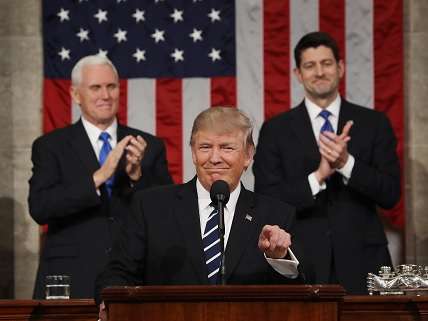Congress and POTUS Agree: The President Can Bomb Whomever, Whenever He Wants
Congress may let the president do anything when it comes to war, but that doesn't make it constitutional.

The U.S. launched airstrikes against the regime of Bashar Assad in Syria last night, opening up a new front in the two-and-a-half-year U.S. involvement in Syria—while the Trump administration argues it does not need congressional authorization, such an action needs approval from Congress. Congress' failure to this point to assert its constitutional role in war-making should not preclude it from acting now, nor should its history of inaction ever be legitimized as a precedent.
Up to now, U.S. actions have targeted the Islamic State (ISIS), whose self-styled capital is in Raqqa, Syria. The Obama administration, which entered the U.S. into the anti-ISIS military campaign, argued the actions were covered under the 2001 AUMF against the perpetrators of 9/11 and their "associated forces."
While President Obama occasionally expressed a desire for Congress to authorize the campaign against ISIS specifically, the Republican Congress, willing in many other domains to challenge President Obama, never mustered the political will to either approve or prohibit Obama's war on ISIS.
The last time Congress managed to even vote on the issue of authorizing military action was in 2011, when a number of resolutions related to the U.S.-backed intervention in Libya were considered by Congress. The strongest ones specifically defunded the Libya campaign—Republican leaders in Congress did not back it.
Those votes came after U.S. military action in Libya had already started. Obama argued the campaign was authorized by a U.N. Security Council resolution and the Arab League Neither suffices as a replacement for congressional authorization, even if Congress doesn't assert its powers. Obama also argued the military actions didn't fall under the purview of the War Powers Act because they didn't involve "sustained fighting or active exchanges of fire with hostile forces… [or] U.S. ground troops."
The last time a president asked for authorization ahead of a military engagement was in 2002, when President Bush sought, and the Congress approved, an authorization for the use of military force in Iraq, leading eventually to the U.S. invasion of and war in Iraq.
The Trump administration's justification for its airstrikes on Syria manages somehow to be even weaker than Obama's Libya arguments. "It was in the vital national security interest of the US to prevent and deter the use of deadly chemical weapons," Trump said last night. "There can be no dispute that Syria used banned chemical weapons, violating its obligations under the chemical weapons convention and ignored the urging of the UN Security Council."
But the Security Council canceled a vote scheduled for last night, and the Chemical Weapons Convention, to which the U.S. and Syria are party, does not include a mechanism that permits member-states to unilaterally enforce it. Instead, it offers a procedure by which a member-state can demand inspections of any other member-state. Syria joined the convention in 2013, in the wake of a chemical attack that brought the U.S. and the West to the brink of military intervention. Back then, President Obama said he would go to Congress for approval first. He never got it, and eventually the situation was resolved with a negotiated disarmament Syria now appears in violation of.
Pro-interventionist pundits insist the Syrian airstrikes have made Trump a real president. "Trump became president" after ordering the airstrikes, CNN's Fareed Zakaria argued. Such militaristic president-worship, last seen after the joint session of Congress where Trump honored the widow of a U.S. service member killed in a raid in Yemen, was a toxic political norm under previous presidents and is toxic now. Trump also cemented his position as president another way—by continuing the tradition of unilateral military action by the president while also, like his predecessors, pushing the envelope even further.
As a celebrity, Trump learned that people would let him get away with a lot. "When you're a star, they let you do it," Trump said of otherwise unwanted sexual advances. "You can do anything." Members of Congress and the media praising Trump for his unilateral, unauthorized action in Syria, are teaching him a similar lesson about the limits of presidential military power—that for all intents and purposes such limits don't exist.
The time to push back is running out for Congress. If they can't do it with a deeply, widely unpopular president who in his first three months in office has antagonized not just members of the opposition party but members of his own as well, they may never be able to.


Show Comments (47)